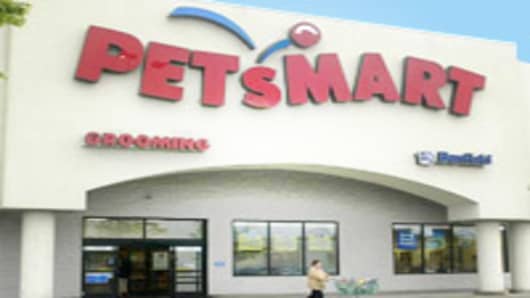Home Depot and Lowe's are clear beneficiaries of a housing recovery. But investors might want to add PetSmart to that list.
"There's a high correlation to housing and pet acquisition," PetSmart CEO Robert Moran told CNBC this week. In addition to spending more money at Lowe's and Home Depot , people tend to get a cat or dog after buying a new home.
"Right now about 62 percent of households, which equates to 73 million households, have pets. We believe we're incredibly well positioned if there's any type of housing recovery to take advantage of this." (Read More: Cities With the Most Affordable Homes.)
Already, there are signs that as the housing market perks up, pet adoptions are rising. Cat adoptions rose 4 percent in October from a year ago after an 8 percent increase in both August and September, according to Pethealth's PetPoint Report. The report aggregates data from 1,072 animal welfare organizations in the United States. Dog adoptions rose 1 percent in October, but were up 8 percent in August and September.
As the housing market gathers pace, a further rebound in adoptions should be good for PetSmart's sales, Barclays hardline retail analyst Alan Rifkin said in an interview. "Pet adopters spend significantly more in the first 12-24 months after a pet adoption," he noted.
There's another long-term secular trend happening as well — the humanization of dogs and cats. "Pets are now being looked at as members of the family," PetSmart's Moran said. "We think there's a lot of emotional play still in this sector."
With pet owners willing to spend lavishly on their pets even through the recent economic downturn, PetSmart is growing faster than the industry and has positioned itself to capture share from competitors like Petco, Wal-Mart and Target by offering a wide range of products as well as grooming and boarding services.
In the third quarter, comparable store sales grew 6.5 percent. Services sales, which are included in total sales, grew 8 percent.
For 2012, PetSmart anticipates comparable store sales growth of 6 percent to 7 percent, and total sales growth in the 10 percent to 11 percent range. The company also raised its earnings per share guidance from a previous range of $3.30 to $3.40 to $3.47 to $3.51.
PetSmart has also moved from a period of heavy investment in new stores to more controlled capital spending and a focus on dividends and buybacks, Rifkin said. That has improved PetSmart's return on invested capital, a measure of how efficient a company is in allocating capital, to 25.8 percent in 2011 from 15.5 percent in 2008, according to company financials.
"PetSmart is a model for other mature retailers to follow in terms of capital allocation," Rifkin said. (Read More: 10 Cash Rich Companies.)
Rifkin rates PetSmart shares at "overweight" with a $75 price target. That assumes the stock trades at about 19 times his 2013 earnings estimate. While that valuation is on the higher end of PetSmart's historical range of 10 to 19 times, Rifkin is anticipating Street-high 4 percent comparable sales growth next year and he believes that estimate may ultimately prove too conservative.
Additional News: 'Pet Parents' to Spend Big This Holiday Season: PetSmart CEO
Additional Views: Cramer: Until 'Fiscal Cliff' Deal, Buy These Stocks
______________________________
CNBC Data Pages:
- Dow 30 Stocks—In Real Time
- Oil, Gold, Natural Gas Prices Now
- Where's the US Dollar Today?
- Track Treasury Prices Here
______________________________
Disclosures:
Barclays had no conflicts to report.



